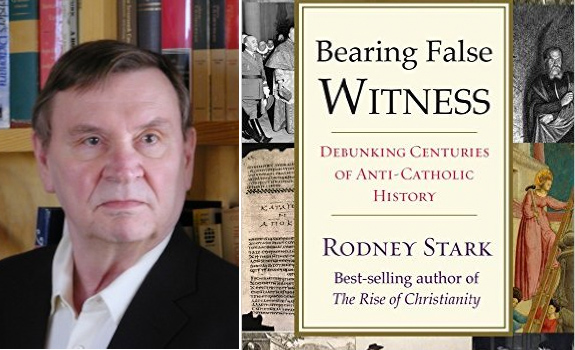
For a change, RW turns to historical trends in religion, namely the phenomenon of anti-Catholicism as documented by Baylor ISR’s co-director Rodney Stark in his new book Bearing False Witness (Templeton Press, $19.57). The book covers topics ranging from myths about Catholic origins and the “lost” Gospels to Catholicism’s attitudes concerning slavery, science, and capitalism. We briefly interviewed Stark about his book in early December.
RW: There have been other books on anti-Catholicism, but Catholics have usually written them; as a non-Catholic, what interested you enough about this subject to write a book on it?
Stark: I kept running into these dreadful lies, and they not only prompt anti-Catholicism, they badly distort history. I became concerned that so many of them are taken for granted by educated people.
RW: The book sets out to debunk stereotypes and other popular myths about Catholicism throughout history, such as about the church’s role in the Inquisition and the Crusades. What myth did you uncover that was the most surprising to you during your research?
Stark: Until I was faced with overwhelming data, it was inconceivable to me that the Inquisition was other than a dreadful, murderous institution. That it was, in fact, a force for moderation was inconceivable to me. But, the fact that the witch-hunts that swept through the rest of Europe were prevented in Italy and Spain by the Inquisition is undeniable. And that was only one of its good deeds.
RW: The role of the church in World War II and its complicity or at least passivity in the face of persecution of Jewish people has been the subject of several popular books, but you argue that the church was unfairly attacked on this front; can you explain that?
Stark: The overwhelming testimony by major Jewish figures is that the church opposed Hitler and managed to save a lot of Italian Jews. The lie about Hitler’s pope began in Moscow.
Muslim students are increasingly finding a home at American Catholic colleges, valuing these institutions’ greater openness to matters of faith, writes Kristin Whitney Daniels in the National Catholic Reporter (November 4). “Although making up a relatively small percentage of students at all schools, Muslim student enrollment at Catholic colleges has increased significantly since 2010, according […]
The sharp growth of Chinese students in American high schools is also serving as a “lifeline to many Catholic schools around the country,” writes Anthony J. Zavagnin in America magazine (October 31). The number of Chinese high school students in the U.S. increased from fewer than 1,000 in 2005 to more than 23,000 by 2013 […]
Founded in 1962 by two students in Missouri, the Church of All Worlds (CAW) was the real life version of a science fiction novel by Robert A. Heinlein, Stranger in a Strange Land (1961). It remains active more than 50 years later, with branches in four countries and an online and print presence, writes Carole […]
The esoteric movement based on the teachings of G.I. Gurdjieff is the latest case of a new religion moving in a more ecumenical and less hierarchical direction as the group’s teachings and writings find a place on the Internet, write David Pecotic and Carole M. Cusack in the current issue of the journal Fieldwork in […]
There is a growing controversy over the use of religious practices in public schools and universities in the Canadian province of British Columbia, reports the Vancouver Sun (November 19). The use of native Canadian or aboriginal spiritual concepts and practices, such as “smudging” (burning sage over one’s body and “spirit”), has been common in schools […]
Results from exit polling suggests that Donald Trump did as well if not better than his Republican predecessors Mitt Romney and George W. Bush among evangelicals, as well as picking up a clear majority among Catholics, reports First Things magazine (November 9). Political scientist Darren Guerra writes that Trump drew a high 81 percent of […]
Opposition to Islam is growing in Poland, even though there are few Muslims there. Those that are there are part of a community that has been integrated into Polish society, often for centuries, writes Katarzyna Gorak-Sosnowska in the Journal of Muslims in Europe (No. 5). The puzzle of intolerance toward the few Muslims in Poland […]
Estonia has been considered one of the most secular countries in the world, but the growth of alternative health teachings and practices may show strong yet overlooked religious and spiritual concerns, writes Marko Uibo in the journal Implicit Religion (19.2). Although Estonians have registered high rates of non-affiliation and belief in religion’s irrelevance (up to […]
Several large Muslim charities in Europe are increasingly taking their cues from corporate life, viewing Islam in instrumental and marketing terms, writes William Barylo in the Journal of Muslim Minority Affairs (36:3). Muslims have set up numerous charitable initiatives in Europe on causes and issues such as halal food certification, finance, education, or Islamic businesses. […]